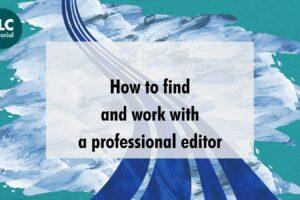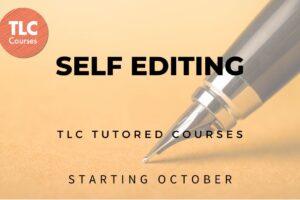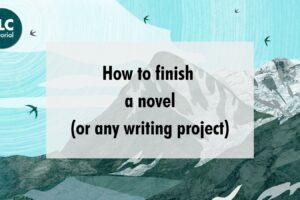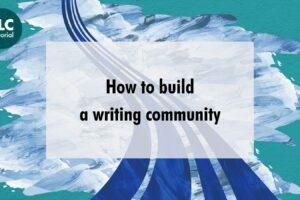How to find and work with a professional editor
Since 1996, The Literary Consultancy has been providing professional editing services to writers at all levels, working across all genres. In the meantime, there has been a proliferation of editorial services, from agencies and consultancies like us to freelance editors offering their services independently. The big question is, how to find a professional editor these days? And once you find them, how to work with them?
Here, we share our top tips on how to find a professional editor, and how to make the most out of working with one.

The right kind of edit
Understanding what kind of editing you need will help you to find the right professional editor for the job. There are different kinds of editorial service available, and each requires a particular kind of skillset. For instance, the assumption that any published author will automatically be a good editor is false. Not every writer wants to edit, and not every writer will be good at editing. The advantage of using a consultancy like TLC is that we have access to a team of 90 professional editors, with an incredible range across all genres, and all types of editing. All of them have had training and guidance from TLC so you can be sure you’re working only with the best editors in the industry.
But if you’re going it alone, it’s still essential to understand the types of editing that exist so you can find the right match for you when searching online. Here are some different types of editing service:
Substantive or Developmental Editing
Substantive editing is the first phase of editing, looking at all of the big picture or macro elements of narrative craft (Plot, Structure, Character Development, Setting, etc). This is also the most involved kind of editing, often requiring an editor to spend many hours carefully reading the work. If you want an edit that goes into the text and makes corrections and suggestions, then you’ll be looking for a developmental edit. These can be expensive, and are a big investment, but a useful one if you would benefit from hands-on attention to help you improve your writing style and voice. Developmental edits sometimes include a mark-up (margin comments), sometimes a full line edit (Tracked Changes with in line mark-up throughout).
Manuscript Assessment (or reader’s report)
Manuscript assessment falls under ‘substantive editing’, but instead of a tracked document with revisions made by your editor, you will receive a written report, sometimes called a reader’s report. This is TLC’s most popular service and is the same kind of report that an in house editor or literary agent would provide to their author when working with them ahead of publication. It is also the most cost-effective option, as you still get detailed notes, but the editor doesn’t have to charge for the additional substantial time required to mark up a manuscript. Broken into sections, a manuscript assessment report provides writers with clear feedback on key areas for improvement and development, so that you can go and implement that feedback and improve your book.
Copy-editing and proofreading
Whilst there is no formal accreditation for substantive editing, there are qualifications and accreditations for copy-editing and proofreading. At TLC, we only work with editors who have these qualifications. UK-based training bodies for these services include the Chartered Institute for Editing and Proofreading (CIEP), and the Publishing Training Centre (PTC). We strongly recommend working with properly qualified editors for these services as they are highly technical.
Copy-editing ensures that the text is clean and consistent from the point of view of style, grammar, and punctuation. Copy-editing also includes basic fact checking, checking for consistency, correcting the language, and checking the formatting. If you are writing in English as a second or third language, if you are dyslexic, or if you are simply feeling a little unsure about your use of language, copy-editing can offer a robust framework for ensuring the work you send out to agents and editors is clean and correct. Proofreading is the very final stage of editing, and is often the one that regular authors won’t need. If you are self-publishing, then we highly recommend both copy-editing and proofreading as essential steps before pressing ‘publish’, to ensure your self-published book is as professional as one produced by a commercial publisher.
The right kind of editor
As we mentioned above, it’s important to check that the editor you are working with is legitimate. With a company like TLC, you will know that all editors will have had to engage with our training guidelines, and we work highly selectively with only the best editors. If you’re working with an independent editor, you will want to check for:
A biography or About page so you can see exactly who they are and how they are qualified to provide editing services.
Feedback and reviews
Look for client feedback and reviews, testimonials, and case studies. What is the evidence the editor or company has worked like this before, and done it well? Are they trusted by authors, by the industry, are they recommended by others?
Transparency
Some editors might not want to share their rates, but we believe that editors ought to be transparent about their pricing structures, payment terms, and generally about their processes. Look for clear terms and conditions so you know exactly what you’re agreeing to. For longer engagements like mentoring, always make sure you have a contract or letter of agreement in place where both parties are happy with the terms.
Credentials
Aside from feedback, look for evidence of credentials. For instance, membership to an editing body like the CIEP or PTC. At TLC we are a corporate member of the CIEP, and we are also a member of the Federation of Small Businesses as part of our commitment to upholding best practice as a small business at all times.
The right match
Importantly, think about what kind of editor you need. If you are writing a romance and you find a crime editor whose website seems really impressive, can you be sure they have the right market knowledge to support you with getting your book to the right readers? Equally, perhaps you are swayed by a copy-editor’s attractive rates, but you can’t find any evidence that they have any qualifications. Be vigilant and find the editor who will work best for you and offer you a trustworthy, quality service. Beyond genre, you might also want to consider method and approach. At TLC, we pride ourselves in matching writers with editors we feel have the right kind of temperament. We know, for instance, which of our editors work best with beginner writers, and which have experience working at a more advanced level.
The Edit and You
Once you have identified the edit you need, and found the perfect editor for the job, there are some things you can do to ensure that you get the most value for your investment. Editing is not cheap, it requires significant attention and skill for an editor to read, examine and analyse a piece of writing, and to give honest, professional feedback that will help you to realise your editorial vision for the book, in line with your personal goals (remember, the best editors guide you towards your own vision, not theirs).
Be clear about your goals and questions.
If you have specific questions or concerns, don’t be afraid to include these in your covering letter or email. An editor might not be able to accommodate a detailed list of 20 questions within the scope of a manuscript assessment report, but it will be useful for them to know, for example, what your primary aim is with this manuscript, where you are with it, and what your key challenges are (for instance, if you’re particularly looking for feedback on character X or plot B, or if you’re struggling to find a way to make the ending work: tell your editor this!)
Be patient
Editing takes time, and often editors working on a freelance basis will have several jobs lined up. If you have a specific editor in mind, be prepared to wait for them to be available, or go to a consultancy like TLC who can match you with someone suitable more quickly from a larger pool. Make sure you check what the timeline is (a good editor will be transparent about this and let you know how long the process will take), and be patient!
Be open to feedback
This one sounds obvious, but while you’re waiting for the feedback to arrive, you can do some preparatory work to help set yourself up for success. First, use the time that the edit takes to establish some objective distance between you and the work. When the feedback arrives, try to shift your mindset from ‘writer’ to ‘reader’. This will help you frame the feedback. Professional feedback can be hard to receive initially, because it focuses on what needs developing. You haven’t spent your well-earned money for someone to tell you the work is fine. Take this as a valuable learning opportunity to get an honest view of where the work is, and think about how you can use the feedback to bridge any gap between where it is now, and where you want it to be. Truth-telling feedback is a gift. Be proud that you’ve invested in your writing, and use this to propel you and your writing forwards. Good luck!
Interested in finding out more about TLC’s professional editing services? Read about them here, or book a free 15-minute discovery call /">here.
Have you already had professional feedback, but feel unsure about what to do now? We run regular Post Feedback workshops where we use our REVISE model to help you implement feedback. All writers are welcome, you do not have to be a TLC client to join.









